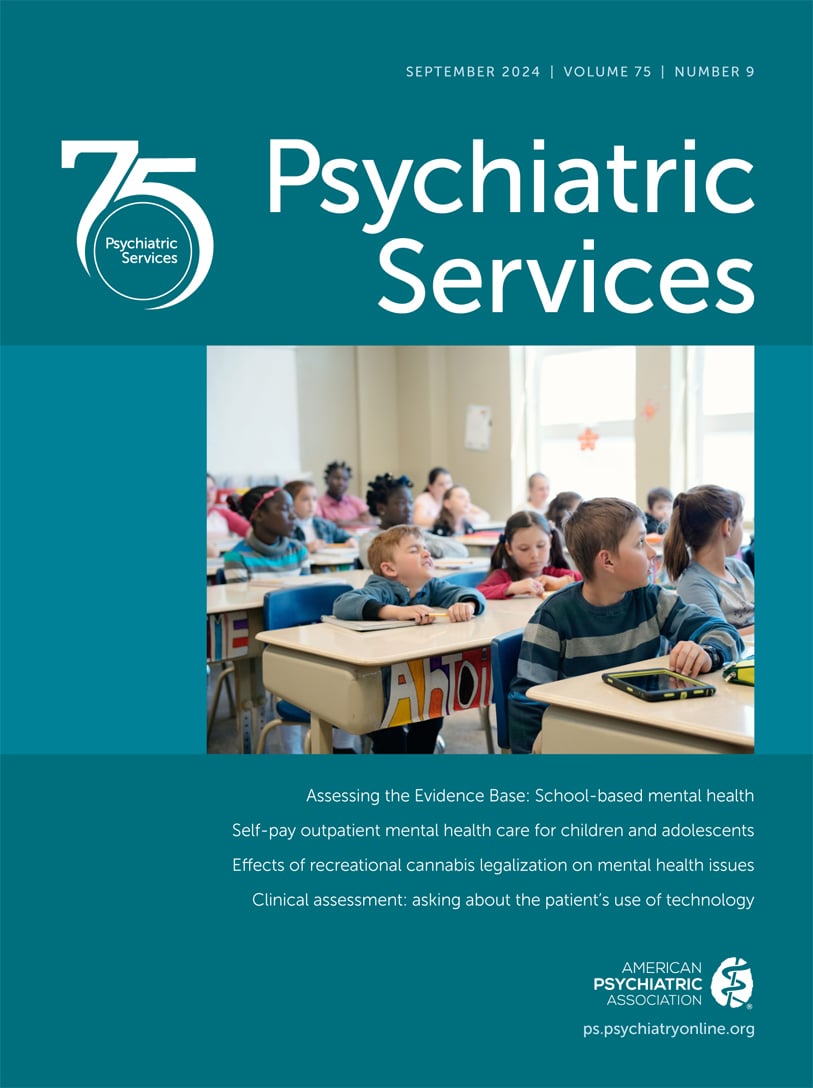Psychiatric Services
- Volume 72
- Number 4
- April 2021
Taking Issue
Articles
Publication date: 10 September 2020
Pages370–377Objective: People with serious mental illnesses are as likely to be parents as people in the general population but are much more likely to have contact with child protective services (CPS) and experience an out-of-home placement of their children. This ...
https://doi.org/10.1176/appi.ps.202000036Publication date: 17 February 2021
Pages378–383Objective: The authors sought to estimate the prevalence of mental and substance use disorders and psychotropic medication prescriptions among working-age sudden-death victims. Methods: Using a written protocol, the authors screened for sudden deaths ...
https://doi.org/10.1176/appi.ps.201900389Publication date: 03 February 2021
Pages384–390Objective: To identify geographic variation in mental health service use in the Department of Veterans Affairs (VA), the authors constructed utilization-based VA mental health service areas (MHSAs) for outpatient treatment and mental health referral ...
https://doi.org/10.1176/appi.ps.202000130Publication date: 09 February 2021
Pages391–398Objective: Psychiatric diagnoses may be a risk factor for poor colorectal cancer (CRC) surgery outcomes. The authors investigated the risk of psychiatric diagnoses and benefit of mental health treatment for surgery outcomes among CRC patients. Methods: This ...
https://doi.org/10.1176/appi.ps.201900559Publication date: 03 February 2021
Pages399–407Objective: Little is known about clients’ preferences for family involvement and subsequent family contact in naturalistic, community-based coordinated specialty care (CSC) settings. The study’s primary goal was to characterize clients’ preferences and ...
https://doi.org/10.1176/appi.ps.202000241Publication date: 27 January 2021
Pages408–414Objective: Individuals with mental or substance use disorders have higher mortality rates than people in the general population. How excess mortality varies across health care facilities is unknown. The authors sought to investigate facility-level ...
https://doi.org/10.1176/appi.ps.202000282Publication date: 09 February 2021
Pages415–420Objective: Targeted, highly accessible early intervention for youths with emerging and complex psychiatric presentations is increasingly needed. The Youth Community Assessment and Treatment Team (YCATT) multidisciplinary service was established to provide ...
https://doi.org/10.1176/appi.ps.201900013Publication date: 01 April 2021
Pages421–428Objective: Substance abuse, particularly among homeless youths, is a significant public health challenge in the United States. Detailed data about health care utilization resulting from this preventable behavior remain sparse. This study aimed to compare ...
https://doi.org/10.1176/appi.ps.202000010Reviews & Overviews
Evidence for Use of Cannabinoids in Mood Disorders, Anxiety Disorders, and PTSD: A Systematic Review
Publication date: 03 February 2021
Pages429–436Objective: Two primary compounds of the cannabis plant (Cannabis sativa), delta-9-tetrahydrocannabinol (THC) and cannabidiol (CBD), differentially and dose-dependently affect mood and anxiety. In this systematic review, the authors summarize the design and ...
https://doi.org/10.1176/appi.ps.202000189Special Article
Publication date: 20 January 2021
Pages437–443Objective: The psychological sequelae of the COVID-19 crisis will increase demands for psychiatric care in already strained emergency and mental health systems. To address the shortage of psychiatrists (and nurse practitioners and physician assistants) in ...
https://doi.org/10.1176/appi.ps.201900501Brief Reports
Publication date: 03 February 2021
Pages444–447Objective: This study examined psychosocial and mental health characteristics associated with COVID-19 infection. Methods: An online survey that asked about COVID-19 status, social support, and mental health was used to recruit a national sample of 6,607 low-...
https://doi.org/10.1176/appi.ps.202000540Publication date: 09 February 2021
Pages448–451Objective: This study compared the costs of implementing a smartphone-delivered mobile health (mHealth) intervention (called FOCUS) with the costs of implementing a clinic-based group intervention (Wellness Recovery Action Planning [WRAP]) for serious ...
https://doi.org/10.1176/appi.ps.202000349Publication date: 03 February 2021
Pages452–456Objective: Research demonstrates variability in mental health clinicians’ overall and domain-specific outcomes for their patients. Despite calls to increase patient access to provider performance information, little is known about patients’ attitudes ...
https://doi.org/10.1176/appi.ps.202000366Open Forum
Publication date: 05 January 2021
Pages458–460Pandemics pose unique risks to people in correctional facilities. Among other vulnerabilities, incarcerated populations often have high rates of mental disorders and substance use disorders, which may increase risks for morbidity and mortality during a ...
https://doi.org/10.1176/appi.ps.202000476Publication date: 09 February 2021
Pages461–463Shared decision making (SDM) is an interpersonal health communication model that is underutilized with people with serious mental illness. Although research has emphasized the role of patient capacity–, clinician-, and system-related barriers in SDM ...
https://doi.org/10.1176/appi.ps.202000156Commentary
Datapoints
Personal Accounts
Global Mental Health Reforms
Publication date: 12 January 2021
Pages475–477In response to three reforms in Dutch mental health care, an organizational framework, including methods and interventions, was developed as part of a new model for acute inpatient care. Core elements of high and intensive care (HIC) include preventing ...
https://doi.org/10.1176/appi.ps.201800440Publication date: 18 December 2020
Pages478–481Since health care delivery in Chile was comprehensively reformed in 2005, treating schizophrenia for its populace has been guaranteed, regardless of individuals’ type of health insurance coverage. The implementation of this national schizophrenia ...
https://doi.org/10.1176/appi.ps.202000018Law & Psychiatry
Publication date: 17 February 2021
Pages482–484People with serious mental illnesses increasingly are being treated in jails and prisons, and during incarceration are afforded a constitutional right to medical care. This right pertains to both general medical and mental illnesses and both acute and ...
https://doi.org/10.1176/appi.ps.202000845Editor's Choice
Corrections
Past Issues
View Issues Archive
Vol. 75 | No. 12

Vol. 75 | No. 11

Vol. 75 | No. 10
